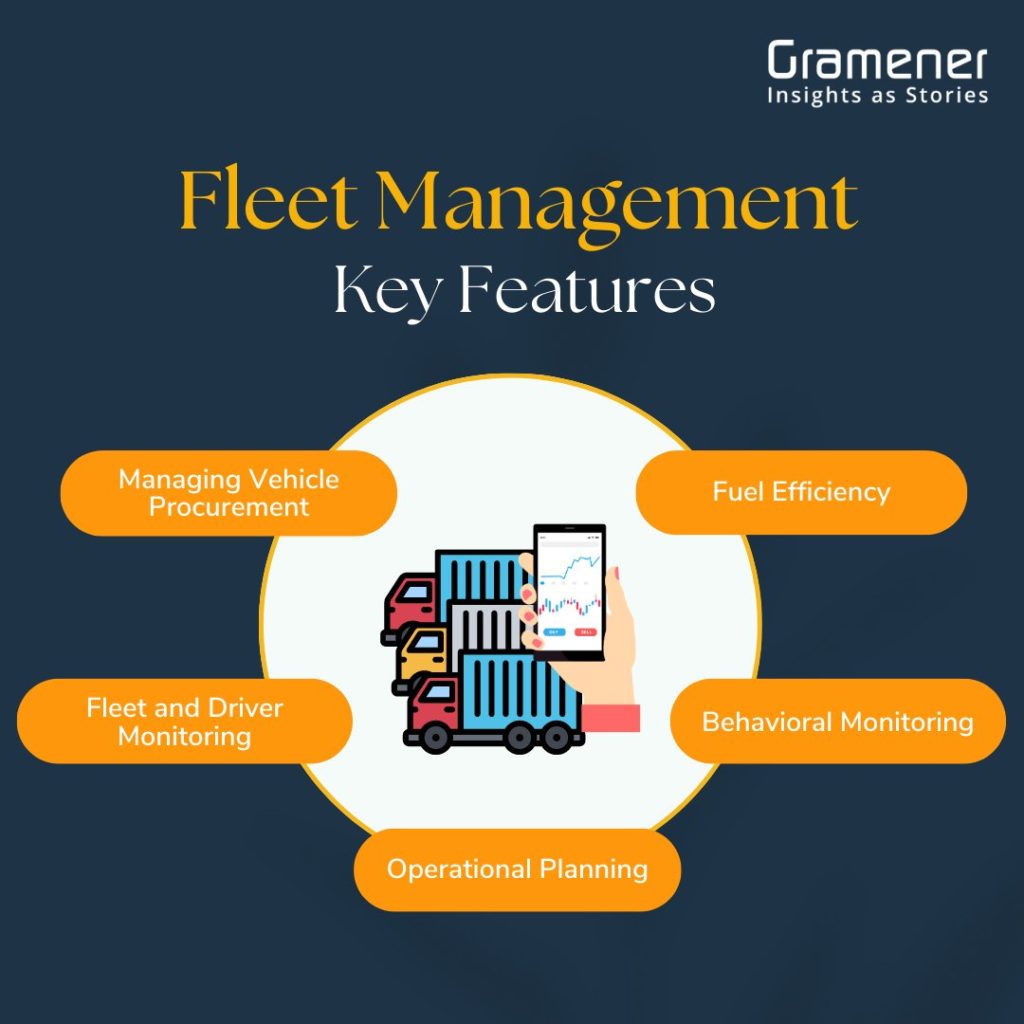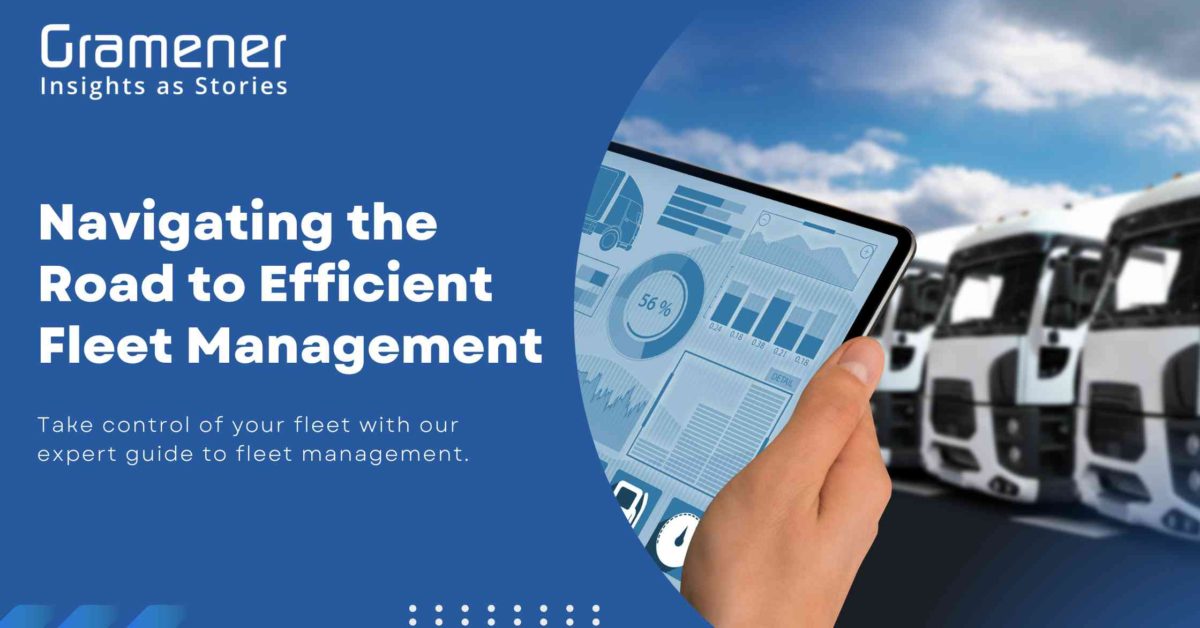Pandemic-induced supply chain disruptions, coupled with fluctuations in the supply of trucking raw materials and components, predict an uncertain year for fleet managers. Navigating these challenges requires agile and efficient fleets. Managing a fleet of vehicles can be tricky without a proper solution to coordinate and control effectively. The lack of a centralized management tool could result in the mismanagement of available resources to meet demand forecasting and distribution schedules. So how can fleet management software add value here? Let’s find out.
Table of Contents
What is Fleet Management?
Fleet management is an umbrella term that covers different aspects of logistics. Aspiring to provide companies better access and control over their supply chains. It must aim for fleet optimization by improving productivity, increasing fuel efficiency, reducing risks, and preparing to solve any roadblocks.
It can be fleet management software that interacts with a hardware counterpart to allow fleet managers with a single dashboard to manage an entire fleet. Imagine a tool that helps manage vehicles’ positioning, stand-by, fuel levels, route planning, pickups, hours of service, and even maintenance needs; that’s a complete fleet management software.
Emerging Trends in Fleet Management
The latest technological trends introduce a few new technologies and transformations. Compared to manual fleet management from a decade ago, modern technologies have made it accurate, documented, and easy to implement for businesses.
Some of the latest trends include the implementation of Artificial Intelligence (AI), the Internet of Things (IoT), 5G connectivity, Driving-assistant solutions, and SaaS software platforms. Together, these technologies can present more value to businesses down the road.
For example, a global food distributor, Sysco, uses an AI-powered driver monitoring program to improve driver safety. The company captures and analyzes data from onboard cameras in its 12,000+ trucks. It detects and alerts risky driver behaviors such as hard braking, lane departure, distracted driving, etc. The system provides detailed reports on every driver’s behavior to identify and address issues and improve fleet safety.
Read More: Supply Chain Scheduling With AI: Automated Solution for Logistics Appointments
Types of Fleet Management
Here are some of the popular types that are often implemented by businesses:
Vehicle Leasing
Businesses often rely on leasing vehicles to facilitate supply chains as per the demand. Vehicle leasing fleet management software makes this job easy, affordable, and competitive for businesses.
Supply Chain Management
This type of fleet management is probably the most popularly implemented among businesses. Supply-chain management could focus on fleet monitoring to improve traceability through the supply chain for more output.
Fuel Management
There are many different agencies to implement fleet management for better fuel usage. From saving costs to saving the environment, fuel management applications are worth the investment for companies. A good fuel management solution would give returns for its investment by saving on fuel expenses.
Tolls and Compliance Services
Fleets travel across different areas and often pass through toll booths and pay tool tax as per the norms. With fleet management, all such expenses and compliances can be managed on the go. Such a solution can also help businesses keep track of all the money spent on various toll booths.
Maintenance Services
Predicting downtime and providing timely maintenance on time ensures that stock is always delivered on time and reaches customers as per expectations. Lack of proper maintenance service can affect brand reputation heavily if the items are not delivered on time as promised due to breakdown and vehicle failures.
Driver and Vehicle Safety
Manually keeping track of individual safety would be impossible, and that’s where fleet management can help. These solutions can also ensure drivers adhere to safety guidelines and ELD mandates. It can significantly bring down any accidents and improve supply chain output.
Key Features of Fleet Management
Businesses can benefit from various applications and features of the right truck fleet management system. Here are some examples and their features:

Managing Vehicle Procurement
Leasing, remarketing, or acquiring new fleets must be well-managed and documented throughout the purchasing process. A fleet management team can simplify this process through procurement planning and reviewing.
Fuel Efficiency
From the perspective of fuel efficiency, fleet monitoring refers to keeping a watch over the fuel usage of vehicles in the fleet. It can help understand efficiency, use, costs, fuel need, and driving practices.
Fleet and Driver Monitoring
Imagine a fleet with thousands of vehicles; it would be impossible to keep a check on vehicles and drivers. However, with fleet monitoring software, driver monitoring can be easy. One can track the vehicle, status, driver details, and electronic journey log.
Behavioral Monitoring
Fleet managers can ensure that drivers are adhering to standard norms and compliances. A fleet management software can also track if the driver’s behavior is aligned with FMSCA’s guidance and ruling. Accordingly, the right training can be imparted to the drivers per their needs.
Operational Planning
Transport is often involved in uncertain events and roadblocks. In such cases, minimizing downtime can help one get maximum output. Fleet management solutions provide daily visibility into field operations, assisting managers in identifying issues and improving operations.
Fleet Management Benefits
Every fleet management type can present different unique advantages for users. Here are some of the most popular benefits of fleet management:
- Minimizing overall operation & fuel costs
- Tracking real-time vehicle status
- Efficiently strategize fleet operations
- Accurately complying with regulations
- Improving driver safety
- Boosting overall productivity
Responsibilities of a Fleet Manager
A fleet manager is responsible for optimizing the entire fleet, starting from the route to safely comply with norms. They manage and resolve any challenges within the fleet management system. Moreover, a fleet manager must consider any downtime, accidental occurrences, and fuel consumption.
Solving Challenges in Fleet Management with Technology
Fleet management solutions address almost every aspect of logistics. Therefore, implementing them can help truck drivers and fleet managers overcome many challenges. Here are the prominent challenges that fleet management platform can resolve:
Lack of Asset Utilization in Supply Chains
The cost to manage and deliver an item directly affects business margins and overall product pricing. Fleet management can unlock the potential of under-utilized drivers, resources, and vehicles for higher business returns.
Inconsistent Driver Behavior and Hours of Service
Hours of service refer to the on-duty hours of a truck driver. FMSCA has rolled out an ELD mandate to ensure road safety and consistency in driving behavior. Fleet management solutions can ensure that driving activities are in-check with expected speed, off-duty times, en-route stops, etc. Driver behavior monitoring can provide safe driving, timely deliveries, and compliant fleet management.
No Traceability or Control Over the Fleet
Visibility over the fleet and each vehicle can help businesses tackle and overcome any roadblock. Any gaps in traceability lead to a loss of valuable time and cost while lagging behind the competition. Fleet tracking solutions can ensure that deliveries are executed as per the plan.
Inefficient Route Planning and Fuel Consumption
Without proper route planning, transporting a carrier from one place to another can consume more than anticipated time and additional fuel. However, fleet management software can allow businesses to go green while saving costs.
Read more: Everything you need to know about Fleet Telematics
How Does Gramener’s Smart Fleet Management Software Help?
At Gramener, we build cutting-edge solutions to cater to the dynamic needs of the supply chain & logistics vertical. Our arsenal includes a smart mobility fleet management solution powered by AI that enables businesses to have complete access and oversight of their fleets and drivers.
Our work on smart mobility is easy and flexible to incorporate with any of your existing transport management systems. With improved optimization, better fleet monitoring, and driver behavioral coaching, we have increased fleet utilization by 10% and reduced logistics costs by 4%.


